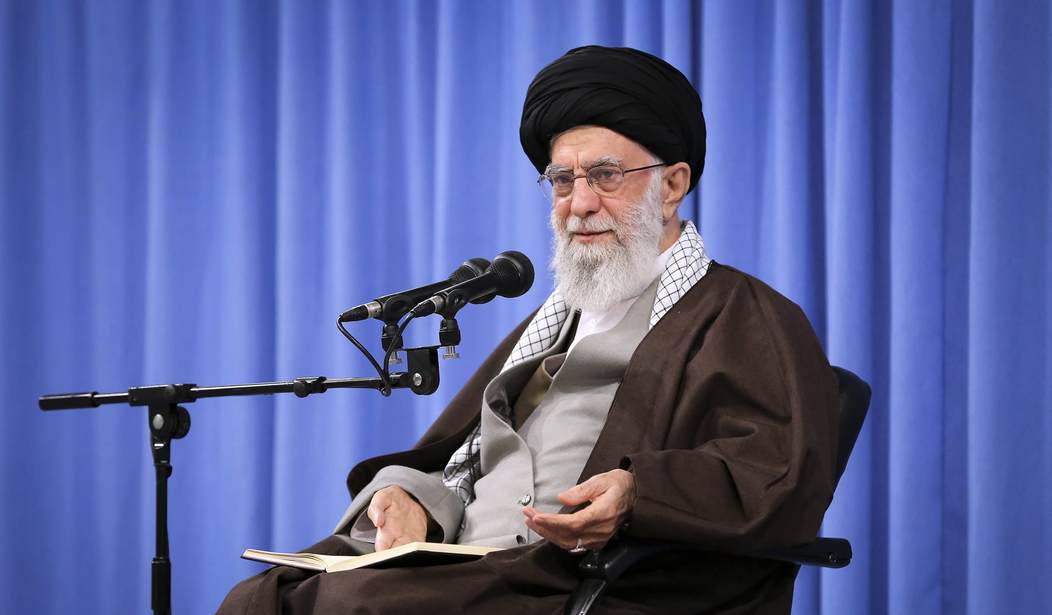A report first carried by the Wall Street Journal says the Trump administration opposes a $5 billion IMF loan to Iran and will stop it from happening.
That’s despite intensifying demands by China, Russia, and European countries for the U.S. to relax its sanctions on Tehran. “Iran,” the Journal notes, “has had about 65,000 reported cases of COVID-19 and approximately 4,000 reported deaths”–though most seasoned Iran-watchers believe the real figures are much higher.
Critics of the U.S. stance say that “rules governing the U.S. humanitarian channel [to Iran] are too onerous to be useful, mostly because of stringent bank reporting requirements. They also argue that easing sanctions would send a powerful message to regular Iranians that the U.S. is on their side and wants to help.”
But Mark Dubowitz and Richard Goldberg of the Foundation for Defense of Democracies have written a blistering riposte to those calling for sanctions relief for the ayatollahs.
They point out, first, that the U.S. sanctions on Iran already make an exception for humanitarian aid. “A recent analysis of pharmaceutical trade between Europe and Iran shows little change between 2011 and 2019 despite periods of imposition, suspension, and return of sanctions.”
Second:
If Iran is experiencing challenges in convincing banks to process transactions with its trade partners, perhaps it’s because Tehran is determined to use its financial sector for money laundering and terrorism finance–concerns that led the Financial Action Task Force, a 39-country anti-money laundering organization, to recommend last month that the global financial community take stringent measures to defend itself against Iran’s illicit practices.
Third, Iran already has a hell of a lot of money that it’s somehow not using to fight its COVID-19 crisis:
Iran’s supreme leader, Ayatollah Ali Khamenei controls more than $200 billion in off-the-books assets in holding companies and foundations and another $91 billion in Iran’s sovereign wealth fund, of which $20 billion is in cash or cash equivalents. He could easily use $40 billion from this corporate empire to support Iran’s $400 billion economy. Instead, he uses this money, most of which was illegally confiscated from Iranians, to fund his revolutionary agenda of domestic repression and regional destruction.
And fourth, Iran’s “revolutionary” agenda includes continued work on its nuclear program “even during the pandemic. Iran’s centrifuges keep spinning, producing more enriched uranium for potential use in a future nuclear weapon. The regime is also denying nuclear inspectors access to certain suspicious sites related to the Iranian nuclear program.”
Money, of course, is fungible, and funneling $5 billion to Tehran in the belief that it will use the funds constructively borders on the insane.
In fact, at about the same time the abovementioned WSJ report came out, Forbes was reporting on some more activities that supposedly cash-strapped Tehran is somehow able to finance:
Evidence suggests that Iran has deployed an array of anti-ship missiles and large rockets overlooking the Strait of Hormuz, which is vital for the supply of oil from the Arab states of the Persian Gulf. The waterway is being patrolled by the U.S. Navy and its allies to protect vessels from Iranian action….
Iran continues to build up its naval capabilities across the board. The Iranian navy recently announced that it is working on a large submarine and a 6,000 ton destroyer.
Does all this mean the Iranian people, many–probably most–of whom oppose (if not outright despise) the regime, should be left to suffer the effects of COVID-19 unaided? No. As Dubowitz and Goldberg point out, the U.S. sanctions already allow humanitarian aid, and they further elaborate:
The U.S. Treasury and the Swiss government established a humanitarian banking channel backed by rigorous oversight to prevent the regime from diverting money and goods away from the Iranian people. Tens of billions of dollars of Iranian oil revenue sitting in foreign escrow accounts are available to fund the import of humanitarian goods. Indeed, that’s how Iran imported $15 billion in essential goods and medicine in the past year, according to the governor of the Central Bank of Iran.
So, as far as humanitarian aid is concerned–yes, if it can be ensured that it really gets to the people it’s supposed to aid. As far as direct cash transfers to the regime by the IMF or anyone else are concerned–absolutely not; it means paying–and freeing up Iranian funds–for terror, subversion, and a conventional and nuclear arms buildup. Fortunately, when it comes to Iran, the Trump administration keeps getting it right.









Join the conversation as a VIP Member